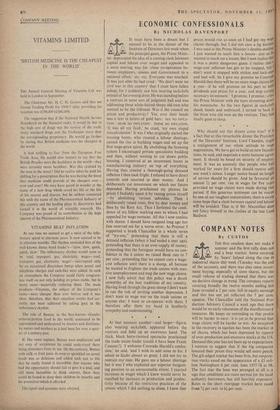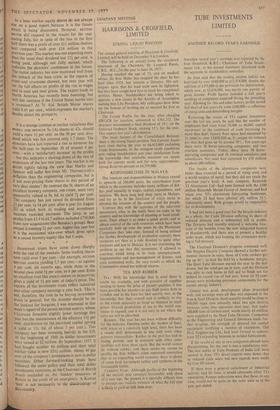COMPANY NOTES
By CUSTOS THE first swallow does not make a summer and the first rally does not end a bear market. Some covering
by 'bears' helped along the rise in industrial shares this week (Tuesday was the end of the account), and there was also some invest- ment buying, especially of store shares, but the small volume of trading showed that there was no decisive change in trend. The company reports covering broadly the twelve months ending last June revealed a 2 per cent. fall in equity earnings and this has not yet reflected the 7 per cent. squeeze. The Chancellor told the National Pro- duction Advisory Council a week ago that there would be no early relaxation of the disinflationary measures. He keeps on reminding us that profits will be harder to earn : it is yet to be proved that wage claims will be harder to win. An exception to the recovery in equities has been the market in oil shares, which has been depressed by reports of over-production and excessive stocks in the US. Demand this year has not been up to expectiitions. I :venture to suggest that if the big companies lowered their prices they would sell more petrol. The gilt-edged market has been firm, but corpora- tion stocks eased on the appearance of a £3 mil- lion Nottingham 6 per cent. loan 1957-78 at 98. The fact that the loan was arranged at all is a sign that conditions are more normal for the local authority borrowers, but still horribly expensive. Rates in the short mortgage market have eased from 7k per cent. to 6k. per cent. In a bear market equity shares do not always rise on a good report because it is the future Which is being discounted. However, BRITISH MOTOR did. respond to the results for the year ending July, for in spite of the loss in the first half there was a profit of over £11 million (before tax) compared with over £14 million in the previous year. The market was not expecting more than the usual final dividend but 123 per cent. is being paid, although not fully earned, which indicates the directors' confidence in the future. The motor industry has now recovered well from the setback of the Suez crisis, as the reports of FORD and STANDARD showed, but next year will see the full effects on profits of the rise in wages and in coal and steel prices. The export trade to North America has recently been booming, but will this continue if the United States moves into a recession? At 7s. 43d. British Motor shares Yield 8.45 per cent., which expresses the market's doubts about the prospects.
•
It is a strange contrast in market valuations that MARKS AND SPENCER 5s. (A) shares at 42s. should Yield a mere 33 per cent, on the 30 per cent. divi- dend which was last covered only 1.7 times. The directors have just reported a rise in turnover for the half-year to September 30 of around 4 per cent.—with a 'satisfactory increase' in the profits —but this indicates a slowing-down of the rate of expansion of the last two years. The market is no doubt rightly taking the view that Marks and Spencer will suffer less from Mr. Thorneycroft's deflation than the engineering companies, but is It not over-pricing these shares in this period of very dear money? By contrast the 5s. shares of an excellent brewery company, IND COOPE, seem very reasonably valued at 9s. 6d. to yield 71 per cent. I he company has just raised its dividend from 13 per cent. to 14 per cent. after a year (to August 31) in which both its trading and investment incomes recorded increases. The jump in net Profits from £3.4 to £4.7 million included £750,000 from new acquisitions (the Benskin's group). Beer output is running 23 per cent. higher this year but it is the occasional take-over which gives spice to a sound brewery equity like Ind Coope.
it Investment trusts have come down sharply
ig With the rest of the markets. Some leading shares in now yield over 5 per cent.—for example, SECOND id BRITISH ASSETS yielding 5.3 per cent.—as against
t- 4 per cent. six months ago, while those in the
IC second class yield 51 per cent. to 6 per cent. Even an excellent trust like ANGLO-AMERICAN DEBENTURE
ts gives a yield of 5.1 per cent. at today's price. The +t reports of-the investment trusts reflect industrial ;s and other company earnings a year back. This is t. not, therefore, the time to be buying investment trusts in general, but the investor should be on the lookout for bargains. I was interested in this
Y week's report of the parent BRITISH ASSETS, whose
. 1 million. About 40 per cent. of the company's investments is now in dollar - securities. Other forward-looking trusts have followed the same policy and their total dollar s Chairman forecasts slightly lower earnings this Year but the maintenance of the effective 13f per cent. distribution on the increased capital (giving a yield at 12s. 9d. of about 5 per cent.). This company has been investing heavily in the US. At the beginning of 1948 its dollar investments were valued at $2 million. By September, 1957, it had bought another $6 million and their total market- value is now $21 investments constitute, as the Chairman of British Assets reminded us, the 'hidden' resources of Britain in the event of an emergency. A Kuwait 'leak' is not necessarily to the disadvantage of this country.



































 Previous page
Previous page